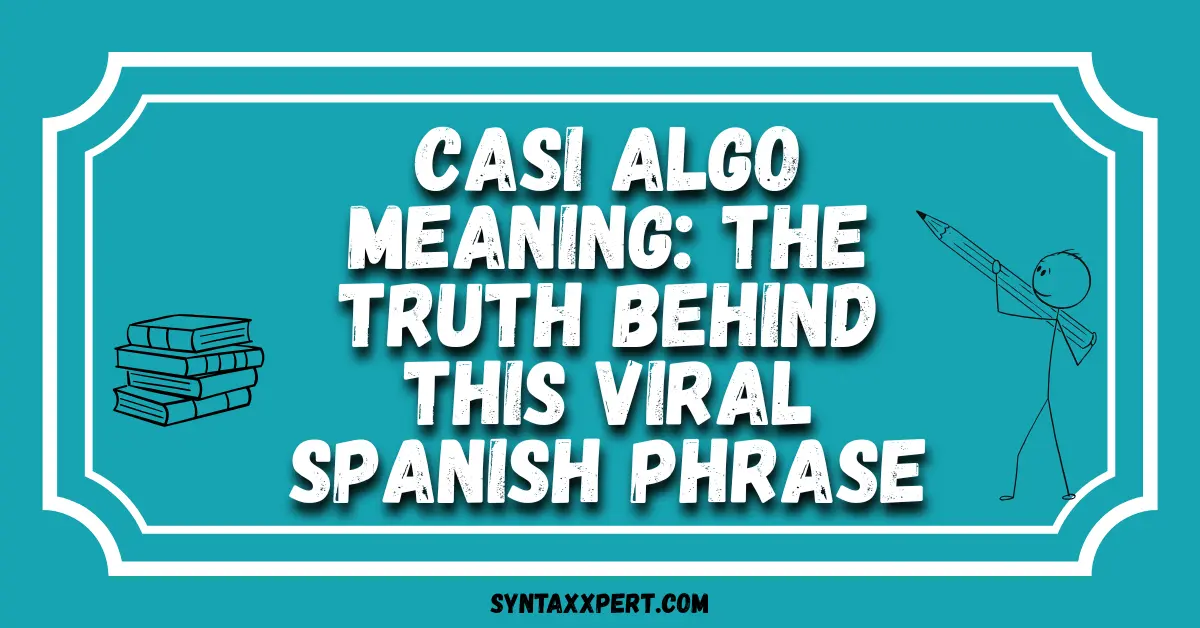Have you ever had someone who was almost your person but never quite became one? That bittersweet “what if” that lingers? That’s exactly where Casi Algo meaning finds its home — in the space between “nothing” and “everything.”
The phrase “Casi Algo” comes from Spanish and literally translates to “almost something.” But if you’ve seen it all over TikTok or heard it in Spanish songs, you know it’s more than just words — it’s a feeling. Let’s explore what Casi Algo truly means, why it went viral, and why people across cultures resonate so deeply with it.
What Does Casi Algo Meaning?
The literal Casi Algo meaning is simple: “Almost something.”
- “Casi” means “almost.”
- “Algo” means “something.”
When someone says “Tuvimos un casi algo” in Spanish, they mean, “We almost had something.” It’s used to describe a connection that never fully became a relationship — the “almost” romance that still tugs at your heart.
“Casi Algo” isn’t about love that failed. It’s about love that almost happened — and that’s what makes it so unforgettable.
The Origin of “Casi Algo”
While Casi Algo has existed in casual Spanish speech for years, it exploded online around 2020–2021, thanks to TikTok and Spanish-speaking creators.
People began using it to describe modern dating situations — the kind where you text every day, share secrets, and even act like a couple, but never make it official.
In Spanish culture, phrases like “Casi Algo” often carry emotional depth, because language itself in Latin communities tends to express feelings more poetically. It’s both a phrase and a mirror of how relationships evolve in the digital age.
Emotional Meaning Behind “Casi Algo”
When someone says “Éramos un casi algo”, they’re not just talking about a label — they’re talking about a memory that almost was.
Casi Algo symbolizes:
- Unspoken emotions that were never confessed
- Moments that felt like love but lacked definition
- Closure that never really came
It captures the nostalgia and pain of “almost relationships” — or what Gen Z now calls situationships. It’s the space between dating and friendship, between reality and fantasy.
“Casi Algo Meaning” in Spanish Culture
Across Latin America and Spain, Casi Algo is a term that resonates differently:
- In Mexico, it often refers to flings or almost-loves that didn’t work out.
- In Spain, it can carry a more poetic or reflective tone.
- In Argentina or Colombia, it’s commonly used in pop culture, especially in music and social media captions.
A popular example is how people caption breakup posts or memes:
“No fuimos nada, pero fuimos casi algo.” We were nothing, but we were almost something.
That line alone has been reposted thousands of times — proof that this phrase carries emotional universality far beyond language.
The Linguistic Breakdown
Let’s take a closer look:
| Word | Meaning | Emotion |
| Casi | Almost | Incomplete desire |
| Algo | Something | Possibility, potential |
| Casi Algo | Almost something | Unfinished love |
Linguistically, the phrase’s strength lies in contrast — the tension between “almost” and “something.” Together, they form a paradox that feels both hopeful and heartbreaking.
It’s not just grammar; it’s emotional linguistics — how two simple words can define an entire generation’s love story.
“Casi Algo” in Modern Relationships
In today’s dating world, we’ve invented new terms for old emotions. “Situationship,” “soft launch,” “talking stage.” All of these, in essence, are forms of Casi Algo.
It’s that moment when:
- You text for months, but never call it dating.
- You care deeply, but pretend you don’t.
- You both know something’s there, but fear to say it.
That’s Casi Algo — the undefined relationship that feels like everything and nothing at once.
A 2023 study from Dating Insights Magazine found that 68% of Gen Z adults admit to being in at least one “almost relationship.” No wonder Casi Algo has become part of the emotional dictionary of modern love.
Real-Life Examples of “Casi Algo”
Here’s how it appears in real life:
| Spanish | English Translation |
| “Fuimos un casi algo.” | We were almost something. |
| “No sé si fuimos algo o nada.” | I don’t know if we were something or nothing. |
| “Era un casi algo que dolía más que un adiós.” | It was an almost something that hurt more than goodbye. |
It’s also used in songs, tweets, and love stories that end too soon — making it one of the most poetic Spanish expressions trending online.
Casi Algo vs Situationship
Although similar, they’re not quite the same.
| Aspect | Casi Algo | Situationship |
| Language | Spanish | English |
| Emotion | Deep, nostalgic, poetic | Casual, modern |
| Tone | Romantic and sentimental | Practical and ambiguous |
| Usage | “Tuvimos un casi algo.” | “We were in a situationship.” |
While situationship sounds like a label, Casi Algo feels like a story. It’s romantic, melancholic, and filled with that unique Latin emotional weight.
How to Use “Casi Algo” Correctly
If you want to use Casi Algo naturally in conversation or writing, remember:
- Use it to describe an emotional connection that didn’t evolve.
- It’s not used for friendships or casual encounters.
- Perfect for expressing nostalgia or closure in Spanish captions.
Example:
“Lo nuestro fue un casi algo que recordaré siempre.” Ours was an almost something I’ll always remember.
Synonyms and Related Spanish Phrases
If you like the poetic tone of Casi Algo, you’ll enjoy these related expressions:
- “Casi amor” – Almost love.
- “Lo que pudo ser.” – What could have been.
- “No fue, pero dolió.” – It didn’t happen, but it hurt.
- “Historia inconclusa.” – An unfinished story.
All of these capture the same emotional territory: unspoken love, unfulfilled potential, and quiet heartbreak.
Casi Algo in Pop Culture
From TikTok duets to Spanish pop lyrics, Casi Algo has become a cultural symbol.
You’ll find it in:
- TikTok trends: Videos labeled “mi casi algo” often feature people reminiscing about past flings.
- Music: Artists like Bad Bunny and Sebastián Yatra use similar phrases about “almost relationships.”
- Memes: It’s the go-to caption for “we never dated, but it still hurts.”
“Casi Algo” has evolved into a universal language of unspoken love.
READ MORE >>> Wanderlust or Wonderlust — What’s the Real Meaning?
What “Casi Algo” Teaches Us About Modern Love
At its core, Casi Algo teaches us that love doesn’t have to be defined to be real. It shows the beauty of “almost” — the longing, the lessons, and the memories left behind.
In an age of dating apps and ghosting, this phrase helps people articulate something deeply human:
“I felt something real, even if it never became official.”
That’s the essence of Casi Algo meaning — not the relationship that was, but the emotion that could have been.
Common Questions About “Casi Algo Meaning”
What does “Casi Algo” literally mean?
It literally means “almost something” in Spanish.
Is “Casi Algo” slang?
Yes, it’s a colloquial expression widely used in modern Spanish conversations and social media.
Is “Casi Algo” the same as “Situationship”?
Not exactly — it’s more emotional and poetic, while “situationship” is casual.
How do you pronounce it?
“Casi Algo” is pronounced KAH-see AHL-go.
Can I use it in formal Spanish?
It’s best kept for informal or emotional contexts, not formal writing.
Quick Summary Table
| Aspect | Meaning | Example |
| Literal Meaning | Almost something | “Fuimos un casi algo.” |
| Emotional Meaning | Unfulfilled love or connection | “We almost had something.” |
| Cultural Use | Common Spanish slang | “Mi casi algo me volvió a escribir.” |
| English Equivalent | Situationship / Almost love | “It was almost something.” |
Conclusion
So, what’s the real Casi Algo meaning? It’s not just a phrase — it’s a feeling wrapped in words.
It represents every unfinished story, every almost-love, and every goodbye that never happened. The beauty of Casi Algo lies in its imperfection — a reminder that even “almost” experiences can leave a lasting mark on our hearts.
“We weren’t something, but we weren’t nothing either — we were Casi Algo.”
🌟 Final Thought
Now that you know the Casi Algo meaning, think about your own “almost story.” Maybe it wasn’t love — maybe it was almost love. And maybe that’s what makes it unforgettable. 💔✨

I’m Luna Hazel, a grammar expert here to help you master the art of clear, confident writing. Let’s make every word count!

